WE LANDED ON THE MOON
On the Cincinnati Bearcats' miracle season, and the footprints they leave.
It took humankind 66 years from first flight to setting foot on the moon.
It took the Cincinnati Bearcats just a little bit longer.
So much of what makes a college football program a so-called “power” is determined by luck, chance, and fortuitous decisions made over a century ago. Perhaps your school hired a coach who possessed an early form of the win-at-all-costs derangement that all successful coaches today have. Maybe an administrator saw the potential for college sports to become the behemoth they are now. Or, maybe you were just at the right place at the right time when a conference was forming, and snuck in before the doors closed. (Looking at you, Vanderbilt and Northwestern.)
There’s no reason that it couldn’t have happened for the University of Cincinnati—a large urban university more than two centuries old, one that’s played college football for 135 years—but for whatever reason, it didn’t. The Cincinnati Bearcats spent much of the 20th century as an afterthought, a sideshow, a team bound firmly to the earth.
Spaceflight was for other people.
Standing on the turf of Nippert Stadium Saturday night, hugging and high-fiving friends and strangers, singing and crying, watching confetti soar through the air, celebrating an undefeated season, a second straight conference championship, and an all-but-certain berth in the College Football Playoff, it was evident that something had changed forever. That clear night sky, once so far away, now belonged to us too.
The first people to talk about landing on the moon must’ve sounded crazy to their contemporaries. Countless generations had looked toward the sky in awe, counting on the moon to light the darkness, to chart a calendar and control the tides, but could scarcely imagine it as a place their descendants might one day walk. Less than a quarter-century before it happened, when George Bailey told Mary that he’d “lasso the moon” for her, it was still mostly a poetic shorthand for making the impossible real. It wasn’t something that was likely to happen, and certainly not in Jimmy Stewart and Donna Reed’s lifetimes.
My junior year at the University of Cincinnati, I lived in a drafty old house just down the hill from campus on Stratford Avenue. I’d bought a Playstation 2 over my previous internship, but being back in architecture school, I was usually too busy to play it. My roommate Dan, who’d made the wiser choice of majoring in business, had more time on his hands, and he immediately took to playing NCAA Football 2003 on the console. One night, arriving home late from studio, I found him playing again, and he told me that he’d taken the Bearcats—then a member of the mediocre Conference USA, and relatively new to playing in even middling postseason bowls—to a national championship. I scoffed, and then Dan treated me to a monologue worthy of the early-20th-century scientific dreamers, explaining how no, we could do it someday.
I didn’t believe him, and why would I?
The first theoretical proposal for spaceflight using rockets was made by William Leitch (the Scottish astronomer, not the sportswriter) in 1861, eight years before the first college football game between Rutgers and Princeton and twenty-four years before the University of Cincinnati first played a game of their own. It would take exactly a century for Russia’s Yuri Gagarin to become the first human in space, and there would be dogs, chimps and people lost along the way. The first Apollo mission, the first step in the long process intended to take the United States to the moon, ended with three astronauts dying on the launching pad.
The Bearcats’ first entry into major competition began in 2005, with an invitation to help replenish a Big East conference depleted by the flight of Boston College, Virginia Tech and Miami to the Atlantic Coast Conference. The Big East wasn’t great, but it offered chances to compete with established football programs like Pittsburgh and West Virginia and—more importantly—it offered an automatic bid to a major postseason bowl game. Instead of the Motor City Bowl or New Orleans Bowl, the Bearcats could be in the mix for the Orange Bowl. The hire of former Ohio State defensive coordinator Mark Dantonio as head coach assisted the team’s rise, followed by Central Michigan’s Brian Kelly after Dantonio departed for Michigan State.
In 2009, it felt like the elements were finally all there.
Fresh off a berth in the previous season’s Orange Bowl, the Bearcats seemed primed for success. Led by senior quarterback Tony Pike, running back Isaiah Pead and dazzling big-play receiver Mardy Gilyard, the Bearcats blew out Rutgers on their own field to open the season and never looked back. They entered the rankings in Week 2, and began a long and hopeful climb to the top. 23. 17. 14. 10. 8. 5. They stalled at #5 but kept winning, hoping enough attrition above them might allow them to sneak into the top two and give a chance to play for a national championship.
They came one second—a single damn second—from that coming true.
The aftermath of that day—December 5th, 2009—felt like it might forever end our space race. Days after beating Pittsburgh in a thriller to seal an undefeated regular season and Sugar Bowl bid, Brian Kelly fled for the Notre Dame head coaching job, leaving the Bearcats in disarray for what might’ve been a triumphant Sugar Bowl game against Florida and instead was an ugly blowout.
Butch Jones—Kelly’s successor at Central Michigan—was brought in, but the window felt like it was closing. Jones won just enough to earn the chance to be hired and later fired by Tennessee, and the Big East quickly crumbled around the Bearcats, with all the life-rafts taken by other teams. Tommy Tuberville treated the program like a half-interested emeritus professor, the American Conference began to look suspiciously like Conference USA, and the sky felt further and further away once again.
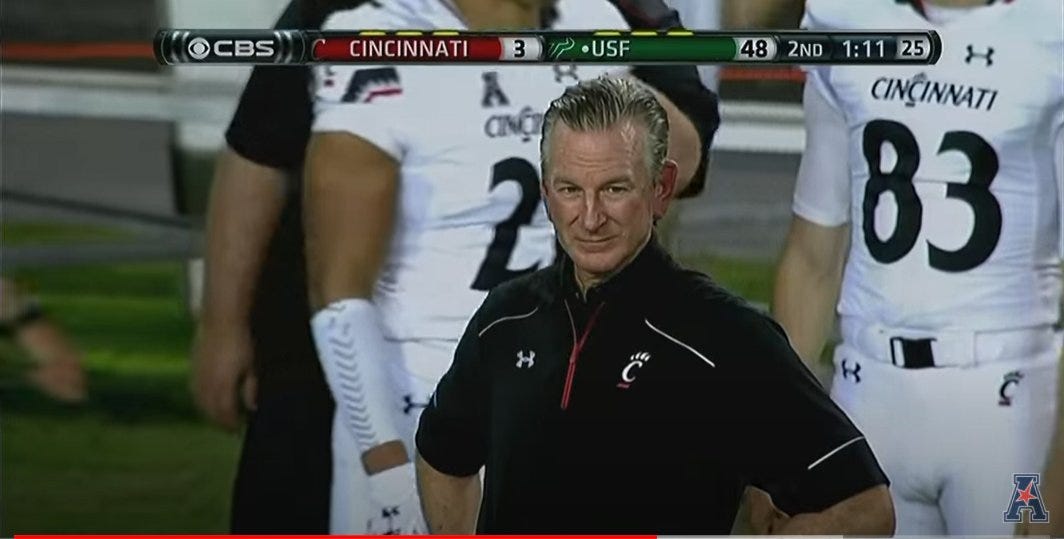
In 2016 and 2017, the Bearcats bottomed out; back-to-back eight-loss seasons to end Tommy Tuberville’s tenure and usher in the Luke Fickell era, an epoch I was less than enthusiastic about.
I’m not old enough to have witnessed the space race firsthand, but I imagine it must’ve been frustrating for American viewers during the late ‘50s and early ‘60s, watching the Soviet Union ring up successes while our own efforts stalled. The future arc of science and geopolitical history wasn’t clear; there was a very real chance that the United States could fall behind, could be defeated, could be relegated to the ashbin of history.
It would have taken more than a miracle for the Bearcats to reach for those highest heights again; it would’ve taken a series of miracles, a convergence of consistently stellar play, fortuitous scheduling, and just plain good luck to dig out of that hole and get in the center of the national conversation. If I’d mapped out everything that needed to happen, it would’ve seemed as impossible as putting humans in a rocket, landing them safely on the moon and bringing them home alive days later.
A freshman quarterback steps in during the first game of the season, on the road in the Rose Bowl, to lead his team to victory and cement his place as starter for the next four years.
A humbling loss against the conference’s then-current standard-bearer later that season to show the team what they were building toward.
Another double-digit win season in 2019.
An unbeaten regular season in 2020 and a playoff snub that built the chorus of voices demanding more access; a close loss to one of the sport’s biggest blue bloods in a bowl game.
The Bearcats would start the 2021 season ranked #8, making the climb far shorter than it was twelve years prior, but destiny was still not entirely in Cincinnati’s hands. Two Power 5 road games—trips to play Indiana in Bloomington and Notre Dame in South Bend—could offer insulation against the “they haven’t played anyone” knock that plagued them the prior year and UCF in 2017, but the assignment was clear.
Beat everyone on the schedule, and then get lucky with other teams losing.
Just like landing on the moon.
What did it feel like on July 20th, 1969, watching on live television as Neil Armstrong stepped out of the landing module? The American space program had advanced by leaps and bounds in that nearly-completed decade, but success was far from guaranteed; William Safire famously composed a speech for then-President Richard Nixon to deliver in the entirely-possible event that the Apollo astronauts died in their attempt.
To see that improbable, audacious mission to succeed, then—to see a human foot step onto a never-before-touched surface, leaving footprints in its fine dust; it had to feel like entering a new world, a world where our basic understandings of what was possible was upended, where the future was suddenly unwritten and up for debate.
I watched from the stands in Bloomington this September as the Bearcats overcame a bad start to comfortably defeat the Hoosiers on their home field; I watched in elation from home two weeks later as they convincingly beat the Fighting Irish in a Notre Dame Stadium that must’ve been 25% Cincinnati fans by headcount and 80% Cincinnati fans by decibel. I watched in terror from the second deck of Nippert Stadium as the Bearcats held off an upset-minded Tulsa with an eight-play goal-line stand to prevent a tie on Homecoming weekend.
The stars slowly but surely aligned, as Ohio State lost once, then twice; Michigan State once, then twice; Oregon once, then twice, then a third time. Notre Dame continued to win, burnishing Cincinnati’s resume. Oklahoma State crept up to the Bearcats’ heels by Championship Week and then fell just short.
By 4pm Saturday, the assignment was clear. For the first time in 135 years, the Bearcats’ destiny was in their hands alone. Win, and you play for a national title.
Nippert Stadium has been a special place to me for a long time; it’s the place I sat for freshman orientation in the summer of 2000, a place I would play ultimate Frisbee on the open-to-students-on-off-days field, a playing surface I would tear across to finish runs in grad school. I have witnessed wins and losses there, good times and bad, but I have never heard it as loud as it was on Saturday. The student section swelled to capacity before kickoff; the standing-room-only crowd roared from start to finish.
Even as Houston struck first in the game, even as the Bearcats clung to a one-point halftime lead, I was strangely calm for the first time all season. I remarked to my friend Cyrus just before the half that it felt like a dam was going to break soon; we weren’t in trouble. Half in jest, half in very-real superstition, I bought Skyline Chili coney dogs for good luck at halftime; the Bearcats opened the second half with 21 unanswered points and I will never tolerate Skyline slander again.
The celebration was on. There was no way they were losing, and there was no way they were keeping the crowd off the field on this night.
Fans lit the night with cellphone flashlights. The clock ticked down. Luke Fickell, the coach who built this miracle, a man whose status has been subject of rumors all season as supposedly-better jobs came open, took a rare break from his habitual stoicism to savor the moment, calling the Bearcats’ two remaining timeouts in the final seconds.
0:00.
The student section erupted onto the field, and the rest of us soon followed. I’ve known Queen’s anthem “We Are The Champions” for longer than I can remember, but man, that song hits different when you’re part of a chorus of hoarse, joyously off-key voices singing it on the very turf where the victory just happened.
We haven’t put a person on the moon since 1972, when Gene Cernan became the 12th human to set foot on that surface. Surely someday humanity will return, whether it’s the United States or Russia or China or some other future nation that’s yet to form, but at the moment, the moon seems distant again; it’s a place we’ve been, but not a place we have plans to go back to any time soon.
Our species’ presence on the moon is not forgotten, though, even if we never go back.
There’s no atmosphere on the moon, no wind to shift the fine grey regolith that those boots stepped into two generations ago. Left undisturbed, the footprints of those twelve astronauts will remain for a million years or more. Armstrong. Aldrin. Conrad. Bean. Shepard. Mitchell. Scott. Irwin. Young. Duke. Schmitt. Cernan. Many of their times on Earth have ended, but their mark on the moon remains.
As quickly the Bearcats’ remarkable achievement this season is celebrated, the naysayers will come out to diminish the feat—to say that they can’t beat Alabama, that they shouldn’t be there, that they didn’t have to fight as hard as they surely did have to fight against a system specifically designed to keep teams like them out.
None of that matters.
It took four years, or twelve, or one hundred and thirty-five depending on how you want to count it, but the Cincinnati Bearcats finally earned the one thing every college football team dreams of and only a select few ever get. They earned the chance to compete to be the sport’s very best, a chance to settle their season on the field and not in the squishy narratives and biased opinions of distant observers. That they reached this stage against such tremendous odds is forever a part of the sport’s record.
This moment cannot be taken away; not now, not ever.
Their footprints are on the moon.
—Scott Hines (@actioncookbook)
Thank you to Cyrus and Mike and the folks at the Republic of Cincinnati tailgate for hosting me multiple times this year, and to Shawn and David and Chad and the Bearcat Journal folks for letting me crash theirs this Saturday too.
Also, if you’re not a Cincinnati Bearcat fan, thanks for listening to all my waxing poetic about this team this year. You’re only going to have to deal with this two more times; once when we beat Bama and once when we win it all.
Go Bearcats.

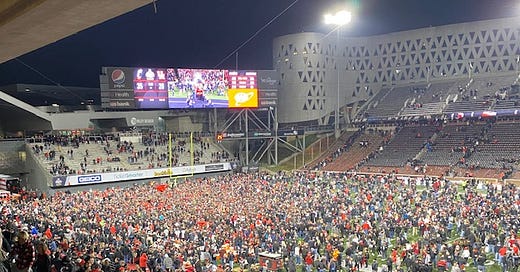


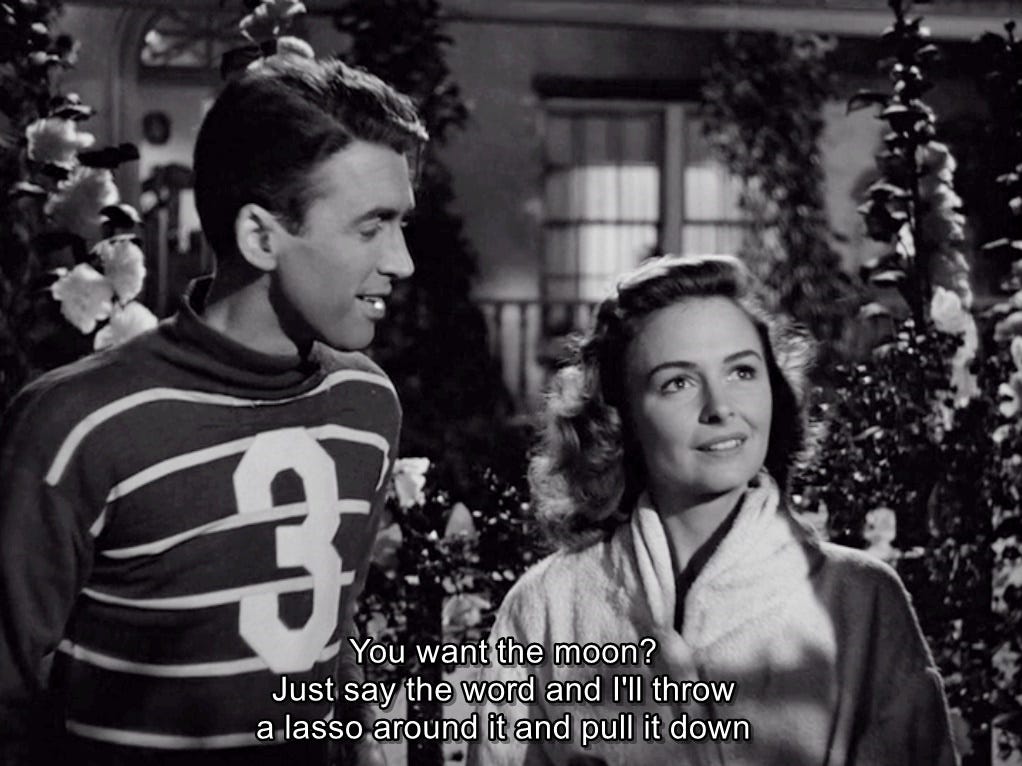

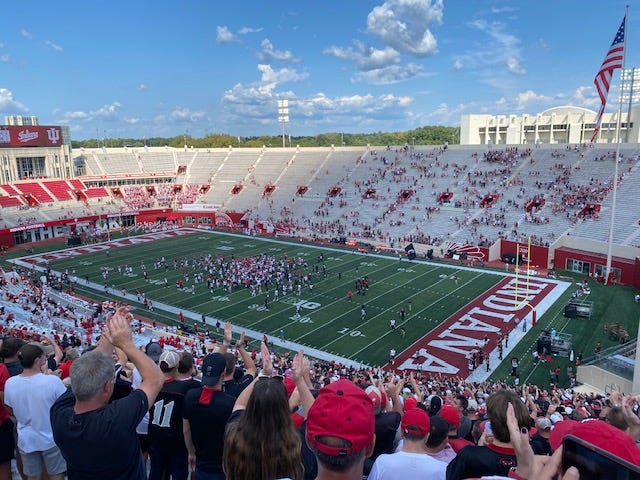
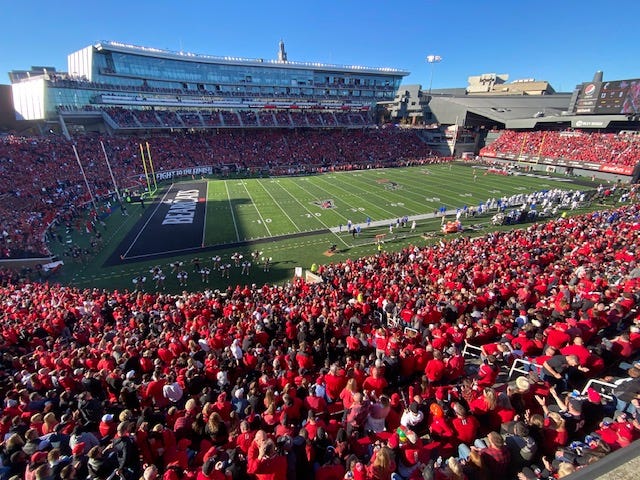

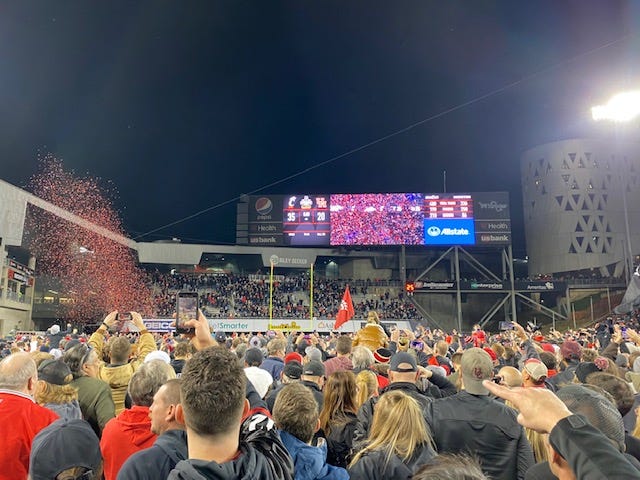
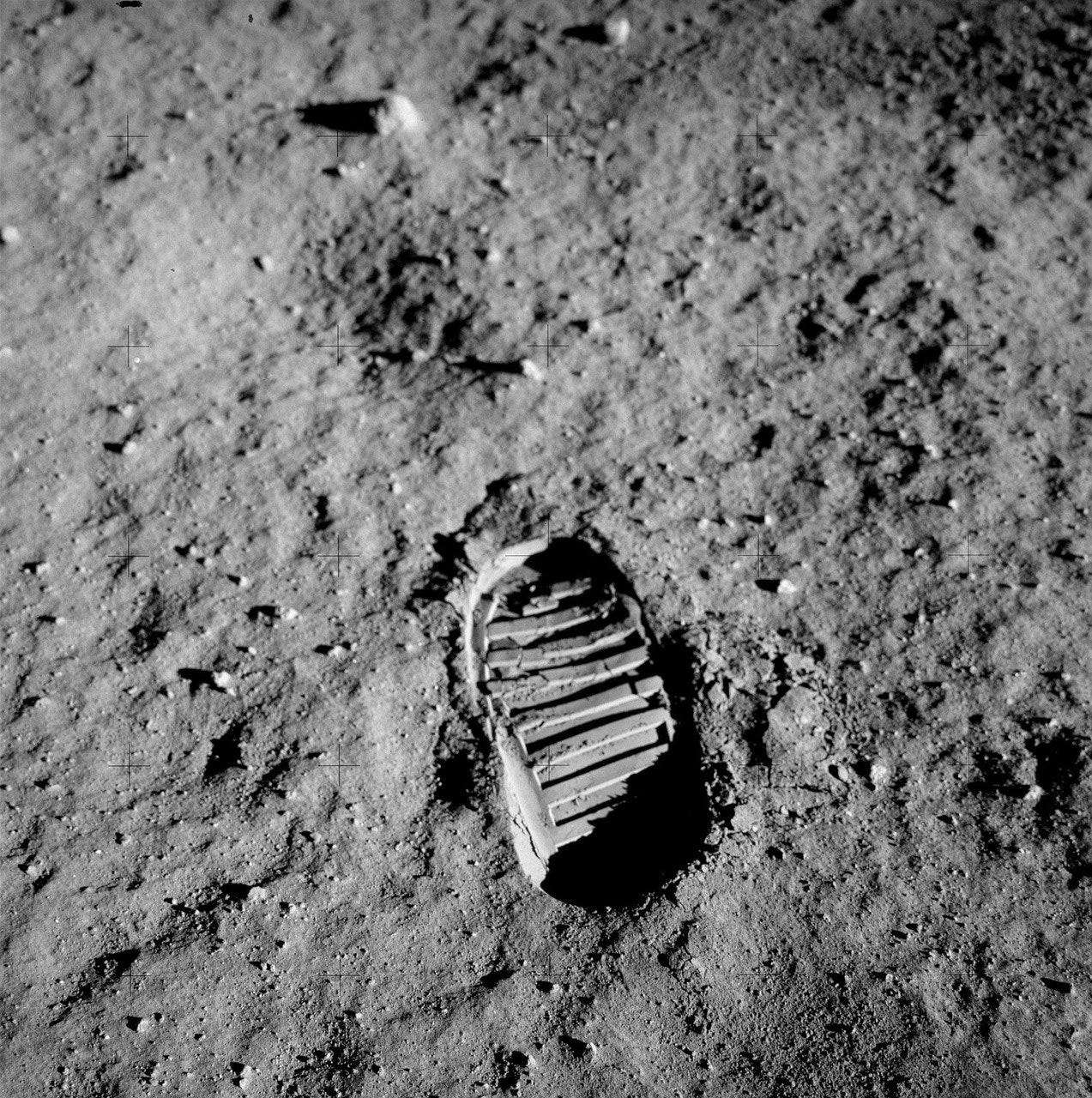
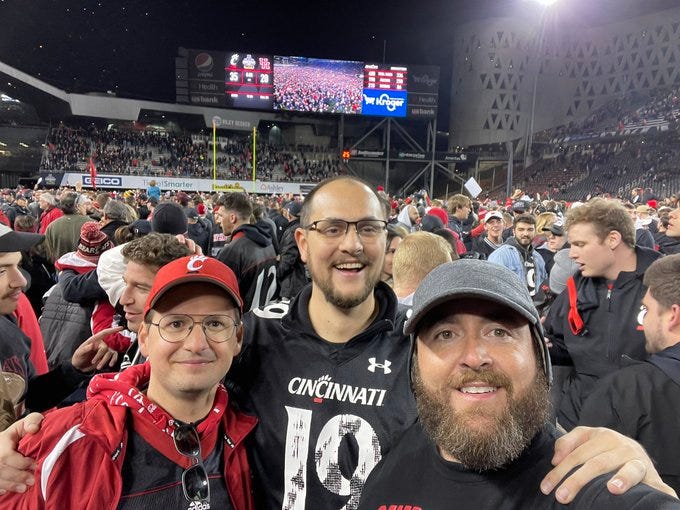
Damn this was good. I'm thrilled for you, my dude. When I saw the official playoff announcement I couldn't help but yell out an ecstatic "GODDAMMIT OLAF!!"
Man, I legitimately could not be happier for anyone on this God-forsaken Internet than you for precisely this reason.